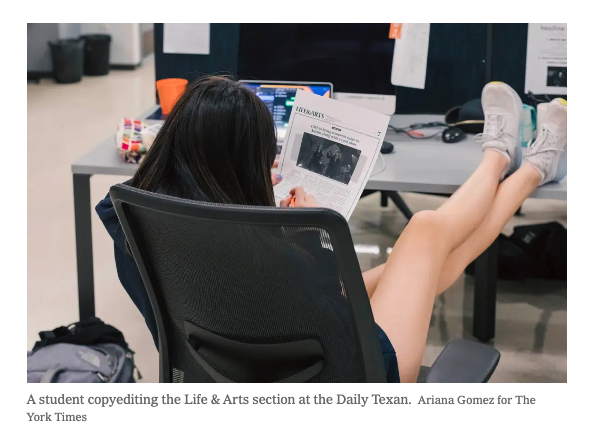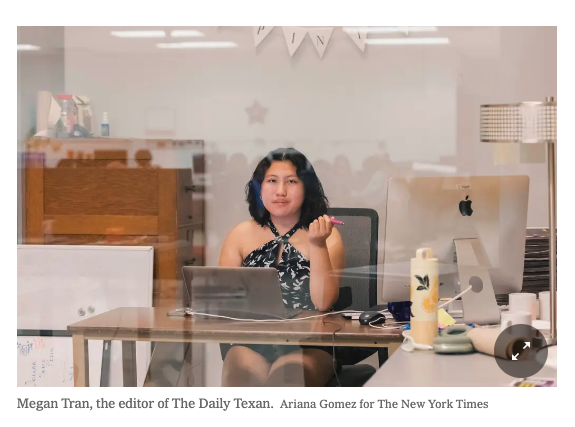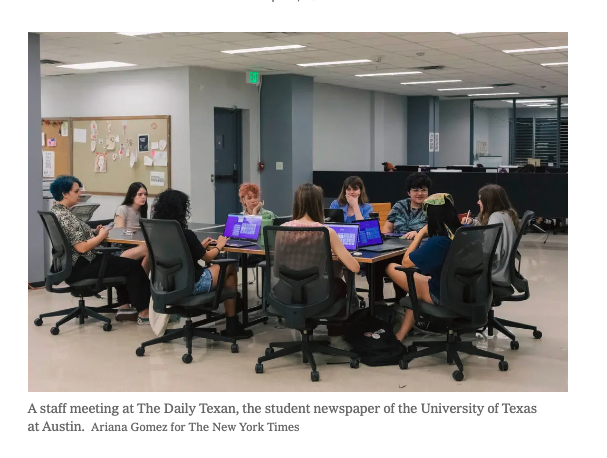Mr. Malesic teaches writing at the University of Texas at Dallas.
April 7, 2023
In the debate over free speech and social justice, commentators on the right and the “heterodox” left often claim that college students are all either stridently liberal or cowed into silence by those who are.
As someone who has spent two decades teaching at colleges large and small, public and private, I don’t recognize this description — and it’s not because I think that it’s conservative students who are dominating the discourse.
In my experience, college students are all too reluctant to express strong opinions about the world at large. I wish my students were so eager to voice their ideas in class. Ideally, they would address the topic of the course, but I’d take what I could get — the news perhaps, social media more likely, the weather if it came down to it. If they’re talking, then maybe I can steer the conversation toward what they need to learn.
But I’ve found one place where students’ ideas emerge into splendid view: the opinion pages of student newspapers. I recently immersed myself in student papers from across Texas, where I live and teach. It certainly wasn’t a scientific sample, but it gave me new insight into an otherwise reticent population.
In those pages, students test out arguments and exercise their thinking and writing skills in the service of an immediate social purpose. Seemingly unprompted, they have something to say. It’s true that these opinion pages feature some debate about mainstream politics and that voices on the left are more prominent than those on the right. But more frequent (and, to me, much more interesting) are the essays about issues that affect students day to day — homework during the first week of class, campus grocery delivery, long-distance relationships.
Reading these essays is a deeply reassuring exercise. I see hope for the future of civic life in these students who are brave (or perhaps naïve) enough to examine an issue in their community and make their best case about it in writing. They know what matters to their readers and draw on shared vocabulary and experience. At their best, these essays exhibit all that opinion writing ought to be.
Just as every campus in Texas has its own character, so does every opinion section. At the state’s colossal public universities, opinion essays often voice a complaint to the university bureaucracy. One columnist for the University of Texas at Austin’s Daily Texan made infrastructure a part of his beat, calling for canopies over campus walkways, more bike racks, more emergency call boxes and greater data storage, along with better maintenance of outdoor water fountains on the sprawling, sun-parched campus.
In The Cor Chronicle at the University of Dallas, a Catholic institution, its great-books curriculum is evident in references to Homer, St. Augustine and Alexis de Tocqueville. One Cor Chronicle article from November alluded to Dante’s “Inferno” in arguing against public barefootedness. The opinion seemed to rile unshod readers both on and off campus, prompting more than a dozen online comments (a lot for The Cor Chronicle) and two rebuttals in the paper.
The opinion section of The Baylor Lariat includes views on liturgical music and the requirement at Baylor, a Baptist university, that students attend chapel. Lariat writers also turn whimsical, with articles on the enduring relevance of Ugg boots and a rundown of the best bathrooms on campus.
Across the state, student writers challenge one another to be better learners and campus citizens: Get out of the university bubble, put your phone away during class, don’t throw away the cafeteria dishes. One Texas A&M Battalion writer argued that her fellow Aggies should get over their reflexive hatred for U.T. — a heterodox opinion if there ever was one.
Social justice issues do arise; The North Texas Daily’s opinion page is heavily progressive and concerned with national and even international issues.
But often student opinions are endearingly local, and as a result, they do not easily fit into a left-right dichotomy. There is no liberal orthodoxy on improving the graduation rate at Texas State University or movement-conservative stance on whether to feed the University of Houston’s ubiquitous squirrels.
Still, one prominent student editor, Megan Tran of The Daily Texan, wrote a column expressing concern that the paper had “become an echo chamber.” As she told me in an interview, the opinion coverage seemed to examine the same issues — diversity initiatives, free services for low-income students — from the same liberal perspective. “I felt like we never reached anyone who didn’t already agree with us,” she said.
This semester she hired columnists who depart from the norm not just politically but also culturally, experientially and academically, drawing from a broad range of majors. Her hope is for The Daily Texan “to reflect the voices of the student body,” she said.
Polls show that traditional-age college students tend to be politically liberal on national issues. But even a conservative former Battalion columnist, Garion Frankel, pushed back against outside claims about the political discourse at A&M. “As someone who has been an Aggie for five years now and has never felt threatened, pushed out or hampered by the alleged ‘wokeness’ of my alma mater,” he wrote, “I think it’s worth defending A&M on this front.” And many universities across the country, including U.T.-Austin, have conservative student papers, often funded by outside donors.
The biggest threats to opinion writing on campus appear to be not ideological but economic and administrative, with some university leaders attempting to exercise greater control. Many student newspapers in Texas have cut production or gone dormant in recent years, mirroring trends in the professional media. Several mainstream student papers also now rely on donations to maintain their independence.
The college opinion landscape is more varied than critics would have you believe simply because student writers are engaged with the world as they know it. In many cases, they are trying to persuade an audience of their peers to take actions that matter in the specific context of their community: Resist the social pressure to get engaged before graduating, quit using the anonymous social media app Fizz, stop packing up before class ends.
Or they are thinking through questions that arise during the transition to adulthood. The Texas A&M Battalion columnist Ana Sofia Sloane wrote in November about her ambivalent feelings about turning 20. “It feels like I’m standing at the edge of a precipice,” she wrote. “In front of me lies a chasm of uncertainty, responsibility and expectation. Taking the inevitable step forward is difficult.”
Ms. Sloane’s sentiment may seem quaint to those of us who fell into that chasm long ago and have the joint pain to prove it. But this milestone matters to her, just as it once did to me, and it most likely matters to her readers. Her essay does what opinion writing should do for society: help us understand and improve our own and one another’s lives.
Jonathan Malesic is the author of “The End of Burnout.” He teaches writing at the University of Texas at Dallas.

